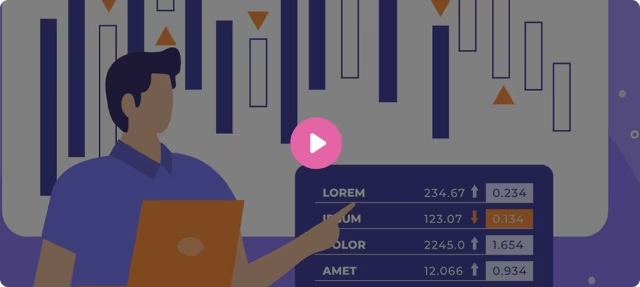 (1).png)
The stock market is one of the most important components of any modern economy, offering individuals and institutions the opportunity to invest, grow capital, and participate in the financial success of public companies. In Pakistan, billions of rupees worth of stocks are traded on the Pakistan Stock Exchange (PSX) daily, providing an active marketplace for a variety of financial instruments, including shares, bonds, and derivatives.
But exactly how stock market works in Pakistan for beginners? What are the processes, institutions, and rules that make it function seamlessly every day? Let’s break it down.
Understanding the Structure of the Stock Market
The stock market, explained for beginners, is essentially a regulated platform where buyers and sellers come together to trade securities such as shares, bonds, and derivatives. Understanding how it works can seem complex at first, but with the right guidance, even new investors can grasp the basics. At its core, the stock market operates through a network of key institutions that ensure transparency, efficiency, and the protection of investor interests.
Before participating, both companies and investors must meet certain regulatory criteria. Companies looking to go public and offer their shares for trading must be approved by the Securities and Exchange Commission of Pakistan (SECP) and the Pakistan Stock Exchange (PSX). Likewise, brokers, traders, and investors are also required to register with SECP and obtain a Unique Identification Number (UIN) through the National Clearing Company of Pakistan Limited (NCCPL). These steps are crucial for maintaining a secure and well-regulated trading environment, especially for those just getting started.
The Two Market Segments: Primary and Secondary
The stock market is typically divided into two main segments:
-
Primary Market
The primary market is where a company offers its shares to the public for the first time through an Initial Public Offering (IPO). In this phase, the company provides detailed information in a prospectus, including financial statements, business models, risk factors, and the purpose of the fundraising. Once the IPO is successfully completed and approved by SECP and PSX, the shares are listed on the exchange.
-
Secondary Market
After the IPO, shares are traded between investors in the secondary market. This is where the bulk of trading activity occurs. Investors buy and sell shares through stockbrokers like Azee Securities, seeking profits through price changes or long-term investments. The PSX provides the digital infrastructure that connects these buyers and sellers.
Step-by-Step: How a Trade Happens
Let’s walk through the basic steps of how a stock trade works in Pakistan:
- Open Online Trading Account:
To begin, an investor must open a trading account and a CDC Sub-Account with a licensed brokerage firm such as Azee Securities. The investor must also complete Know Your Customer (KYC) formalities and obtain a UIN from NCCPL.
- Placing an Order:
The investor places a buy or sell order through their broker’s trading platform.
- Order Matching:
The order is forwarded to the Pakistan Stock Exchange, where the trading system matches the buy and sell orders at a mutually agreed price.
- Trade Confirmation:
Once matched, the trade is executed and confirmation is sent to both the buyer and seller via their respective brokers.
- Clearing and Settlement (T+2):
The NCCPL handles the clearing and settlement of the trade. Pakistan follows a T+2 settlement cycle, meaning that if you buy shares today, they will be delivered into your CDC Sub-Account in two business days.
- Custody of Shares:
The Central Depository Company (CDC) electronically stores the investor's shares in a secure digital account.
The Institutions That Keep the Market Running
Several key organizations work together to ensure that the market operates fairly and efficiently.
-
Securities and Exchange Commission of Pakistan (SECP)
SECP is the apex regulatory body for Pakistan’s capital markets. It formulates rules, supervises market participants, and protects investor interests. Its key responsibilities include:
- Regulating brokers, listed companies, and exchanges.
- Ensuring transparency and corporate governance.
- Preventing market manipulation and fraud.
- Promoting investor education and financial literacy.
-
Pakistan Stock Exchange (PSX)
PSX is the main trading platform where stocks, bonds, and derivatives are traded. It provides the infrastructure, systems, and governance needed for secure and efficient market transactions.
-
Central Depository Company (CDC)
CDC acts like a "digital vault" for securities. When you purchase shares, they are stored in electronic form in your CDC Sub-Account. It eliminates the need for physical share certificates and facilitates faster and more secure transfer of ownership.
-
National Clearing Company of Pakistan Limited (NCCPL)
NCCPL ensures that trades are settled smoothly and on time. Its responsibilities include:
- Trade matching and confirmation.
- Clearing and settlement of trades.
- Managing investor UIN registration.
- Implementing Centralized Know Your Customer (KYC) processes.
These three institutions—PSX, CDC, and NCCPL—form the triangular foundation of Pakistan’s capital market, each playing a crucial role in maintaining trust and integrity in the financial system.
The Role of Brokers
Brokers are licensed intermediaries between the investor and the stock exchange. Firms like Azee Securities are responsible for:
- Executing buy/sell orders on behalf of clients.
- Offering research and advisory services.
- Helping investors complete account opening and regulatory compliance.
- Routing transactions to PSX and handling post-trade support.
Without a registered broker, individual investors cannot access the stock market.
KYC and Regulations
Pakistan’s capital market is tightly regulated to protect investors and maintain market integrity. SECP frequently issues circulars, regulations, and compliance guidelines. Market participants are required to:
- Maintain accurate and up-to-date records.
- Comply with anti-money laundering (AML) laws.
- Conduct due diligence through KYC requirements.
- Report suspicious transactions.
These mechanisms help prevent fraud, insider trading, and unethical practices.
Quick Recap
- The stock market provides a platform for companies to raise capital and for investors to trade shares.
- Trades occur in two markets: Primary (IPO) and Secondary (post-listing).
- Investors need a trading account, CDC Sub-Account, and UIN to start trading.
- Institutions like SECP, PSX, CDC, and NCCPL ensure smooth and transparent functioning.
- The T+2 settlement cycle ensures timely transfer of shares and funds.
- Stockbrokers like Azee Securities serve as a vital link between investors and the market.
Get Started with Azee Securities
Ready to begin your investment journey with Azee Securities? Open a Stock Trading Account and gain access to the Pakistan Stock Exchange (PSX). Let Azee Securities help you make informed decisions. Our expert advisors, advanced trading platform, and real-time market data ensure you stay ahead of the curve.
Azee Securities Private Limited
Member Pakistan Stock Exchange | PMEX | NCCPL | CDC
SECP Registered & Regulated

